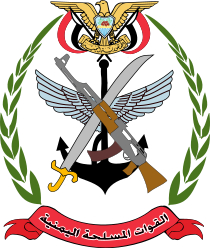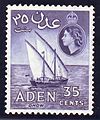Portal:Yemen
Yemen Portal


Yemen (/ˈjɛmən/ ⓘ; Arabic: ٱلْيَمَنْ, romanized: al-Yaman), officially the Republic of Yemen, is a sovereign state in West Asia. Located in the southern Arabian Peninsula, it borders Saudi Arabia to the north, Oman to the northeast, and the Indian Ocean to the south, sharing maritime borders with Eritrea, Djibouti and Somalia across the Horn of Africa. Covering roughly 528,000 square kilometres (203,861 square miles), with a coastline of approximately 2,000 kilometres (1,200 miles), Yemen is the second largest country on the Arabian Peninsula. Sanaa is its constitutional capital and largest city. Yemen's estimated population is 34.7 million, comprised mostly of Arab Muslims. It is a member of the Arab League, the United Nations, the Non-Aligned Movement and the Organisation of Islamic Cooperation.
Owing to its geographic location, Yemen has been at the crossroads of many civilisations for over 7,000 years. In 1200 BCE, the Sabaeans formed a thriving commercial kingdom that included parts of modern Ethiopia and Eritrea. In 275 CE, it was succeeded by the Himyarite Kingdom, which spanned much of Yemen's present-day territory and was heavily influenced by Judaism. Christianity arrived in the fourth century, followed by the rapid spread of Islam in the seventh century. Yemenite troops playing a crucial role in early Islamic conquests. Various dynasties emerged between the 9th and 16th centuries. During the 19th century, the country was divided between the Ottoman and British empires. After World War I, the Mutawakkilite Kingdom of Yemen was established, which in 1962 became the Yemen Arab Republic (North Yemen) following a coup. In 1967, the British Aden Protectorate became the independent People's Democratic Republic of Yemen (South Yemen), the first and only officially socialist state in the Arab world. In 1990, the two Yemeni states united to form the modern Republic of Yemen (al-Jumhūrīyah al-Yamanīyah), with Ali Abdullah Saleh serving as the first president until his resignation in 2012 in the wake of the Arab Spring.
Since 2011, Yemen has been enduring a political crisis, marked by street protests against poverty, unemployment, corruption, and President Saleh's plan to amend Yemen's constitution and eliminate the presidential term limit. By 2015, the country became engulfed by an ongoing civil war with multiple entities vying for governance, including the Presidential Leadership Council of the internationally recognized government, the Houthi movement's Supreme Political Council, and the separatist Southern Movement's Southern Transitional Council. This conflict, which has escalated to involve various foreign powers, has led to a severe humanitarian crisis. (Full article...)
Selected article -
The Yemeni Armed Forces (Arabic: الْقُوَّاتُ الْمُسَلَّحَةُ الْيَّمَّنِيَّة, romanized: Al-Quwwat Al-Musallahah Al-Yamaniyah) are the military forces of the Republic of Yemen. They include the Yemeni Army (including the Republican Guard), Yemeni Navy (including the Marines) and the Yemeni Air Force (including the Air Defense Force). The capital of the country, Sana’a is where the military is headquartered. Per the constitution of Yemen, the President of Yemen serves as the commander-in-chief.
The supreme commander of the armed forces is disputed between Rashad al-Alimi, Chairman of the internationally recognized Presidential Leadership Council, and Mahdi al-Mashat, the chairman of the Supreme Political Council. (Full article...)List of selected articles
|
|---|
Selected biography -
Tawakkol Abdel-Salam Khalid Karman (Arabic: توكل عبد السلام خالد كرمان, romanized: Tawakkul 'Abd us-Salām Khālid Karmān; also romanized Tawakul, Tawakel; born 7 February 1979) is a Yemeni Nobel Laureate, journalist, politician, and human rights activist. She leads the group "Women Journalists Without Chains," which she co-founded in 2005. She became the international public face of the 2011 Yemeni uprising that was part of the Arab Spring uprisings. In 2011, she was reportedly called the "Iron Woman" and "Mother of the Revolution" by some Yemenis. She is a co-recipient of the 2011 Nobel Peace Prize, becoming the first Yemeni, the first Arab woman, and the second Muslim woman to win a Nobel Prize.
Karman gained prominence in her country after 2005 in her roles as a Yemeni journalist and an advocate for a mobile phone news service denied a license in 2007, after which she led protests for press freedom. She organized weekly protests after May 2007 expanding the issues for reform. She redirected the Yemeni protests to support the "Jasmine Revolution," as she calls the Arab Spring, after the Tunisian people overthrew the government of Zine El Abidine Ben Ali in January 2011. She was a vocal opponent who called for the end of President Ali Abdullah Saleh's regime. (Full article...)List of selected biographies
|
|---|
General images -
Selected city -

Taiz (Arabic: تَعِزّ, romanized: Taʿizz) is a city in southwestern Yemen. It is located in the Yemeni highlands, near the port city of Mocha on the Red Sea, at an elevation of about 1,400 metres (4,600 ft) above sea level. It is the capital of Taiz Governorate. As of 2023, the city has an estimated population of approximately 940,600 residents making it the third largest city in Yemen.
Due to the ongoing campaign as part of Yemen's civil war, Taiz is currently a battleground and a war zone. (Full article...)Selected picture -
Selected cuisines, dishes and foods -
List of articles
|
|---|
Related portals
Religions in Yemen
Arab states
Categories
Topics
Related portals
Religions in Yemen
Arab states
Associated Wikimedia
The following Wikimedia Foundation sister projects provide more on this subject:
-
Commons
Free media repository -
Wikibooks
Free textbooks and manuals -
Wikidata
Free knowledge base -
Wikinews
Free-content news -
Wikiquote
Collection of quotations -
Wikisource
Free-content library -
Wikiversity
Free learning tools -
Wiktionary
Dictionary and thesaurus










































































